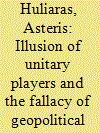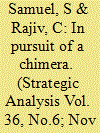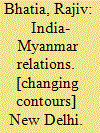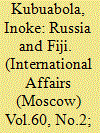| Srl | Item |
| 1 |
ID:
117508


|
|
|
|
|
| Publication |
2012.
|
| Summary/Abstract |
Journalists, academics and politicians portray the European Union and China as unitary actors that follow coherent strategies towards 'Africa'. These perceptions help in turn to sustain a discourse of geopolitical competition: the EU and China are presented as bitter rivals of a new 'Cold War'. This 'new scramble for Africa' narrative is an illusion. Despite official declarations, Brussels' ties with 'Africa' are only a small part of a complex web of relationships. Moreover, China's presence in Africa is far less monolithic than outside observers assume. However, these flawed perceptions are quite persistent because they serve the ambitions and interests of governing elites.
|
|
|
|
|
|
|
|
|
|
|
|
|
|
|
|
| 2 |
ID:
115893


|
|
|
|
|
| Publication |
2012.
|
| Summary/Abstract |
Efforts undertaken to address concerns generated by the Iranian nuclear issue have primarily followed a dual-track approach made up of punitive non-proliferation and economic sanctions at the multi-lateral and unilateral levels and diplomatic-political engagement across the bilateral, tri-lateral and multi-lateral spectrum. These have, however, not been successful in 'forcing' cooperation from Iran on core issues of concern, including in such activities as the stopping of uranium enrichment activities. This is in part due to the mutually reinforcing antagonistic nature of the two-track strategy. While Iranian intransigence has attracted increasingly tough punitive measures, these measures have in turn hardened Iranian positions. They have also been hostage to the nature and content of bilateral relationships that Iran shares with its major interlocutors. While Iran's contentious relationship with the US and the UK and the concomitant trust deficit have bedeviled these efforts, sound strategic/economic reasons underpinning Iran's bilateral ties with Russia and China explain these countries' role as the 'reluctant enforcers'.
|
|
|
|
|
|
|
|
|
|
|
|
|
|
|
|
| 3 |
ID:
141023


|
|
|
|
|
| Publication |
New Delhi, Routledge, 2016.
|
| Description |
xxi, 257p.: tables, mapshbk
|
| Standard Number |
9781138191327
|
|
|
|
|
|
|
|
|
|
|
|
Copies: C:1/I:0,R:0,Q:0
Circulation
| Accession# | Call# | Current Location | Status | Policy | Location |
| 058324 | 327.5409591/BHA 058324 | Main | On Shelf | General | |
|
|
|
|
| 4 |
ID:
130856


|
|
|
|
|
| Publication |
2014.
|
| Summary/Abstract |
The author offers opinions on foreign relations between Russia and Fiji. The 40th anniversary of the establishment of diplomatic relations between the Soviet Union and Fiji is cited as a milestone in those relations. Significant improvements in relations are said to have been created since 2008 as part of Fiji's decision to become more active in international relations. Russia is seen as one of Fiji's most important bilateral relationships.
|
|
|
|
|
|
|
|
|
|
|
|
|
|
|
|